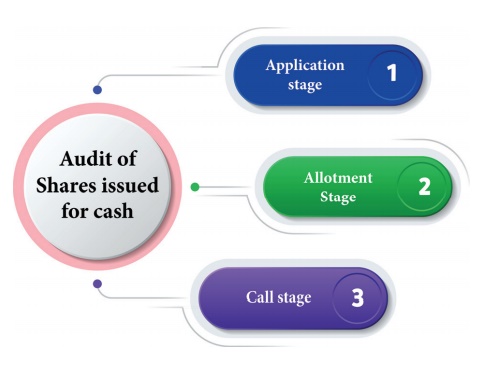Auditing - Audit of Shares issued for Cash | 12th Auditing : Chapter 10 : Company Audit
Chapter: 12th Auditing : Chapter 10 : Company Audit
Audit of Shares issued for Cash
Audit of Shares issued for Cash
Shares
issued for cash can be done in three stages as: (a) Application Stage, where
applications were received along with application money; (b) Allotment Stage,
where allotment takes place and allotment money is received subject to the
receipt of minimum subscription; (c) Calls stage, where calls are made on
shares and the amount due is received.

a. APPLICATION STAGE
a)
The auditor should check the original share
application. He should check the entries in Application and Allotment Book.
b)
He should vouch the application money received
with Application and Allotment Book and the corresponding entries in cash book.
He should ensure that application money received was deposited in a scheduled
bank until the certificate of commencement of business is obtained. He should
verify whether application money received is not less than 5% of the nominal
value of shares issued.
c)
He should vouch the money refunded to
unsuccessful applicants with Application and Allotment Book, copies of letters
of regret and bank book.
d) He
should check the total columns of Application and Allotment Book and see that
proper journal entries have been passed in the books.
b. ALLOTMENT STAGE
a)
The auditor should see that allotment begins
only after the receipt of minimum subscription.
b)
He should examine the Directors’ Minute Book to
see that all the allotments have been approved by the Board.
c)
He should compare the copies of Letters of
Allotment and Letters of Regret with entries made in the Application and
Allotment Book.
d)
He should check the amount received on
allotment, by comparing Application and Allotment Book with Cash Book.
e)
He should check the postings in Share Register
of the amount received on application and allotment.
f)
He should see that the relevant RBI and FEMA
requirements, in case of allotment to non-residents.
g)
He should see that appropriate journal entry
debiting Share Allotment and crediting Share Capital Account has been duly
made.
c. CALL STAGE
a)
The auditor should examine the board of
director’s resolution in the Directors’ Minute Book for making calls.
b)
He should verify the amount received with the
counterfoil of receipts.
c)
He should compare the total amount due on calls
with the amount collected and entered in the cash book. He should trace out the
figures of call-in-arrears by comparing the ‘Schedule of Calls in Arrears’ with
Application and Allotment Book, and check the accuracy of the amount.
d) He
should see that appropriate journal entry debiting Calls Account and crediting
Share Capital Account has been duly made.
Related Topics